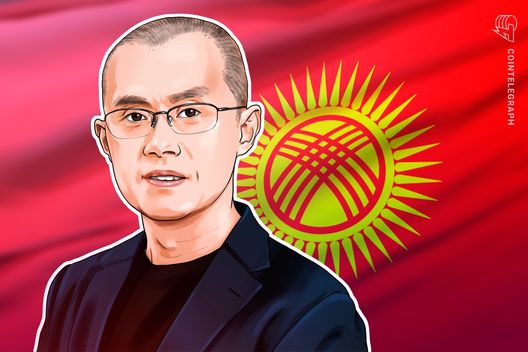
CZ Refutes Kyrgyzstan President's Claims: No Crypto Private Bank Proposal from Ex-Binance CEO

A surprising claim from the President of Kyrgyzstan, Sadyr Japarov, regarding a proposal by former Binance CEO Changpeng "CZ" Zhao to establish a private bank dealing in cryptocurrency within the Central Asian nation, has been swiftly and unequivocally denied by Zhao himself. The incident has cast a spotlight on the volatile intersection of international finance, digital assets, and high-level political rhetoric, especially concerning figures like CZ, who remains under intense global scrutiny.
The President's Bold Assertion
The controversy began when Kyrgyz President Sadyr Japarov made a notable statement during an interview, asserting that Changpeng Zhao had approached his administration with a proposition to create a specialized private bank. This proposed institution wouldn't just handle traditional banking services but would also prominently feature cryptocurrency transactions and asset management. For a nation like Kyrgyzstan, often seeking avenues for economic development and modernization, such a proposal from a figure of CZ's stature—despite his recent legal woes—would naturally be seen as a significant opportunity to attract foreign investment and position the country as a burgeoning hub for digital finance.
Japarov's remarks implied a direct engagement with CZ, suggesting that the former crypto titan was actively looking to establish new ventures, even as he navigates a complex legal landscape. The idea of a "crypto private bank" itself speaks to a growing trend in the financial world: catering to high-net-worth individuals and institutions looking for sophisticated, regulated pathways to manage their digital asset portfolios alongside conventional wealth. For Kyrgyzstan, embracing such an initiative could signify a bold step towards integrating cryptocurrency into its national financial infrastructure.
CZ's Swift and Clear Rebuttal
However, the narrative took a sharp turn almost immediately following President Japarov's interview. Changpeng Zhao, known for his active presence on social media, wasted no time in publicly refuting the claims. Taking to his preferred platform, CZ issued a concise yet firm denial, stating categorically that he had made no such proposal to the Kyrgyz government. His statement aimed to dispel any misconceptions, emphasizing that his current focus is entirely on his legal situation in the United States, where he is awaiting sentencing after pleading guilty to charges related to money laundering at Binance.
Zhao's denial was crucial for several reasons. Firstly, it directly contradicted a head of state's public statement, highlighting a potential miscommunication or misunderstanding at a high diplomatic level. Secondly, for CZ, whose every move is meticulously watched by regulators and the global crypto community, any perceived new business venture—especially one that could be interpreted as attempting to circumvent existing financial oversight—would be highly detrimental to his legal standing and public image. His current legal constraints would likely prevent him from engaging in or even initiating such an extensive international project at this time.
Understanding the Context: CZ's Legal Landscape
To fully grasp the significance of CZ's denial, one must consider his current circumstances. After stepping down as CEO of Binance, the world's largest cryptocurrency exchange, CZ pleaded guilty to violating U.S. anti-money laundering laws. This plea was part of a landmark settlement that saw Binance agree to pay over $4.3 billion in penalties. CZ himself faces a potential prison sentence, with his sentencing hearing currently set for late April 2024. In such a critical period, embarking on a new, high-profile financial undertaking, particularly one involving a 'private crypto bank' in a foreign nation, would be highly improbable and legally inadvisable.
His current focus, as he has repeatedly communicated, is on cooperating with authorities and preparing for his sentencing. This legal cloud makes it exceedingly difficult for him to launch or be perceived as launching any new major business initiatives, especially those that could invite further regulatory scrutiny or suggest an attempt to rebuild his empire outside conventional legal frameworks.
Kyrgyzstan's Crypto Aspirations and Broader Implications
While CZ's involvement remains unequivocally denied, President Japarov's initial claim does shed light on Kyrgyzstan's potential aspirations in the digital finance space. Like many developing nations, Kyrgyzstan may see cryptocurrency and blockchain technology as a means to leapfrog traditional financial infrastructure, attract investment, and foster technological innovation. A 'crypto private bank' could be an ambitious step towards establishing the country as a more progressive player in the global digital economy.
However, this incident also underscores the delicate balance between political rhetoric, economic ambition, and the realities of global financial regulation. Misinformation or premature announcements can have significant repercussions, particularly when involving prominent international figures and cutting-edge technologies. For the crypto industry, it serves as a reminder of the constant need for clarity and verified information, especially when dealing with high-stakes ventures and the reputations of its leading personalities.
Ultimately, while the idea of a CZ-backed crypto private bank in Kyrgyzstan remains firmly in the realm of speculation and denial, the episode offers a fascinating glimpse into the ambitions of nations and the complex lives of influential figures in the ever-evolving world of cryptocurrency.
Keywords: Crypto
